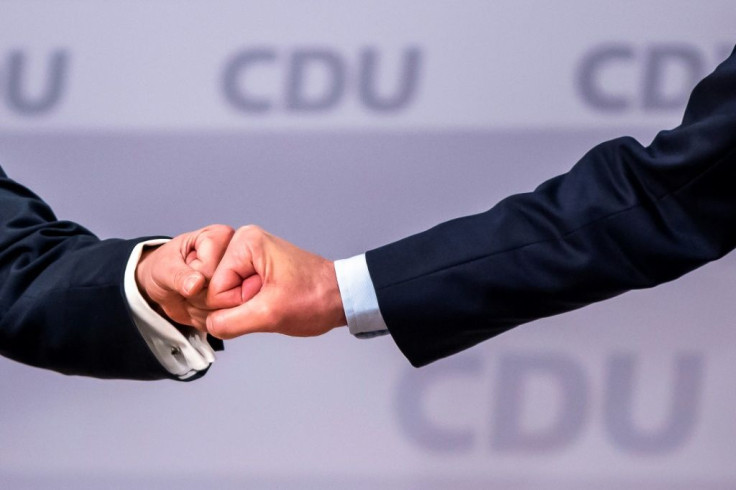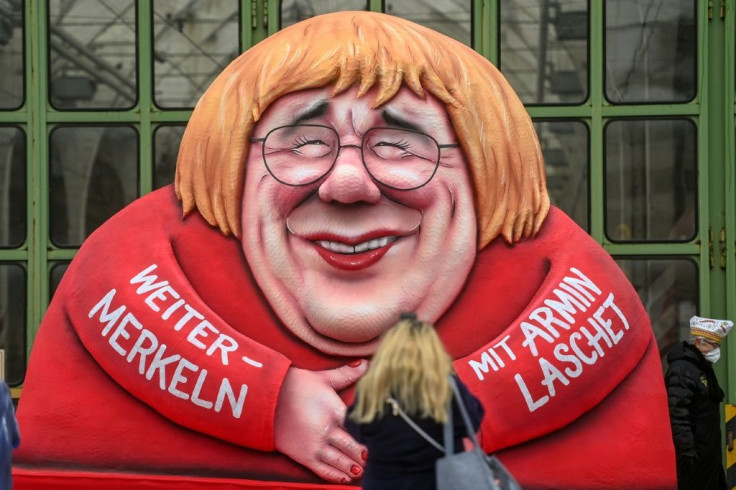German Conservatives Unveil Post-Merkel Plan
Germany's conservatives on Monday promised no tax hikes, pragmatic action on climate change and a tough stance on Russia and China as they unveiled their plan to win voters in September's election in the absence of their veteran leader Angela Merkel.
Armin Laschet, the leader of Merkel's Christian Democratic Union (CDU), and Markus Soeder, chief of the smaller Bavarian Christian Social Union (CSU), pledged "stability and renewal" as they launched their manifesto in Berlin ahead of the September 26 vote -- the first in 16 years not to feature Merkel.
Laschet -- the conservatives' pick to succeed Merkel as chancellor -- called for a "modernisation drive for Germany", promising to combine "consistent climate protection with economic strength and social security".
The two men appeared together in a show of unity after months of damaging infighting over who would be the candidate for chancellor -- one of several setbacks for the bloc in recent months as it looks towards a post-Merkel era.

But the alliance has gained momentum since naming Laschet for the top job, bringing home a thumping win in a key regional election and now polling on around 28 percent, ahead of the Greens in second place with about 21 percent.
Soeder on Monday admitted he had faced some "disappointments" but said he harboured "no resentment" towards Laschet. "We have cleared everything up and talked it out with each other," he said.

The CDU-CSU alliance, also known as the Union, has dominated German politics for much of the past 70 years but faces a struggle to rebrand itself without Merkel, who despite many ups and downs remains immensely popular.
"For a long time, Merkel alone was the Union's manifesto," the Bild daily wrote recently, suggesting that Laschet had been "rushing from meeting to meeting" in a scramble to finalise a new strategy for the alliance.
At final talks before the manifesto launch on Monday morning, Merkel stressed that global politics was entering a "new era", sources close to the talks told AFP.
The conservatives have faltered as Merkel prepares to bow out, suffering from anger over the government's pandemic management and a corruption scandal involving shady coronavirus mask contracts.

For several weeks earlier this year, they lost their customary lead in the polls to the Greens, who surged following the nomination of their youthful chancellor candidate Annalena Baerbock, 40.
But a poll for the RTL broadcaster last week had Laschet as Germany's top pick to replace Merkel on 23 percent, ahead of Baerbock for the first time since they both threw their hats in the ring.
Laschet has long been a close ally of Merkel and has pledged to continue the chancellor's moderate centrist course.
The new manifesto adheres to economic foundations of the conservative dogma -- no tax hikes even though the pandemic has dug a big hole in the country's budget.
Any tax hikes would be an "obstacle to the necessary recovery of our economy," argued the conservatives.
On foreign policy, it rejects EU membership for Turkey and calls for a united front from Europe and the United States against China, which it describes as "the greatest foreign and security policy challenge of our time".
But it is the conservatives' climate programme that might be most closely scrutinised at home, given that the Greens are shaping up to be not only their closest competitor but also a potential coalition partner after the vote.
The manifesto promises to "combine sustainable growth, climate protection and social security" to achieve Germany's goal of climate neutrality by 2045, but it also stresses this must be done without "new burdens on companies".
Criticising the conservatives' plan as "lacking courage", Baerbock said the alliance wanted only to "muddle through as before".
She accused the alliance of failing to offer any real reform projects to achieve climate neutrality and of banking on emissions trading to achieve a greener future.
"Therefore the whole thing is very unfair and unsocial," she said.
© Copyright AFP 2024. All rights reserved.





















